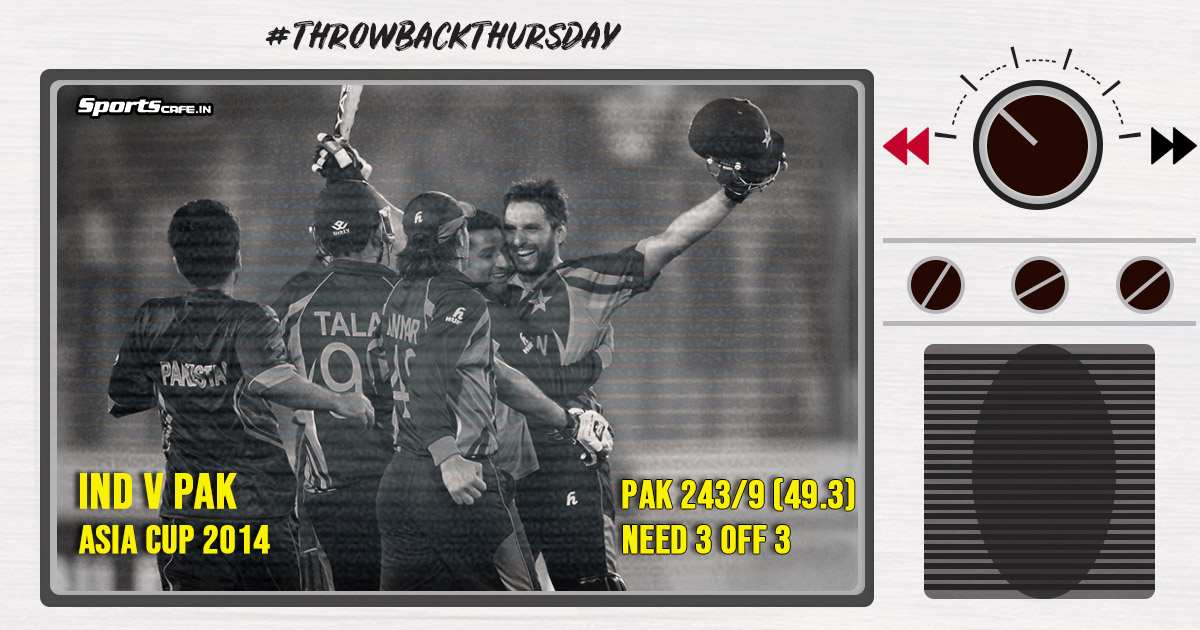Throwback Thursday | Shahid Afridi’s last ball six seals victory for Pakistan in Asia Cup
Welcome to the series where we present you a moment, a game in history that has shaped the way the sport has been played, in our weekly segment ‘Throwback Thursday.' This week, we recap the historic Shahid Afridi six off Ravichandran Ashwin in the 2014 Asia Cup, one that broke Indian hearts.

It’s March 2nd, 2014. The clock is threatening to strike 10.00 PM and we are at the Shere Bangla National Stadium in Dhaka for the Asia Cup match between India and Pakistan. Ravichandran Ashwin has the ball in hand for India and for Pakistan, it’s Shahid Afridi on strike. The equation is simple: Pakistan need 3 runs to win off the last 3 balls to script a historic win over arch-rivals India, but they have a solitary wicket in hand, with Afridi being the last and the only recognized batsman. The match, up until this point, has seen seven hours of brutal, non-stop, exhilarating action and has, by far, been the closest game these sides have contested in the entirety of the decade. But before we get to the climax, let us recap, rewind and see what got us to this moment.

 © YouTube
© YouTubeBefore we get to the present, let us remember that this is a rivalry that dates way back to 1952, to the days of Vijay Hazare, Lala Amarnath, Polly Umrigar and Hanif Mohammad. Over the course of time, it has seen many a classic and heated moment and match - be it Javed Miandad hitting Manoj Prabhakar for a last-ball six or Venkatesh Prasad’s send-off to Aamir Sohail or more recently, the historic inaugural World T20 Final. The situation now, however, is completely different. The Mumbai terror attacks in 2008 led to India banning the participation of all Pakistan players from the IPL and an all-time-high political turmoil between the two countries meant that they only faced each other seven times in the entirety of this decade.
But despite Pakistan historically holding the edge in ODI cricket - leading 71-50 in H2H history - for a good part of the last decade, and more specifically in the last four years or so, it has been all India. India, since 2006, have won 15 of their 24 clashes in ODI cricket versus Pakistan and post 2010, have won five and lost just twice against their arch-rivals in the 50-over format. Again, brewing political tension between the countries, meant that they only clashed in ICC events and in their last H2H meeting, in Champions Trophy 2013 in Birmingham, the MS Dhoni-led Indian side brutalised Pakistan to comfortably stroll to victory.
But heading into this colossal clash, things aren’t so straightforward for the Indians, who arguably are favourites and have more to lose due to their sheer dominance in the shorter formats in this decade. They are being led by young gun Virat Kohli owing to incumbent skipper Dhoni missing the Asia Cup with a side strain and are heading into this contest having lost their last two bilateral series - against New Zealand and South Africa respectively - and having won only 1 of their last 10 matches in the format. They also head into this contest knowing they’re chasing a trophy that has evaded them for four years and to keep their hopes alive, will have to turn over the defending champions. Surprisingly, much in contrast to the recent trend, Pakistan entered this match-up with 6 wins in their last 10 ODIs, having outclassed South Africa and Sri Lanka in their last series. But like India, they, too, suffered a defeat at the hands of Sri Lanka early on in the tournament, meaning they need a win to keep their hopes of defending the Asia Cup title alive.
So with the stakes astronomically high and pride at stake, Misbah-ul-Haq wins the toss and decides that his side will bowl first. Remember, this is all new for Pakistan, who before this match had lost each of their last three tosses against India. So Misbah knows that his side cannot let this opportunity go.
Pakistan’s plan for the Indian openers is clear from the very first ball: strangle Shikhar Dhawan with spin and attack Rohit Sharma with pace. And so they open with Mohammad Hafeez, the off-spinner, from one end and Umar Gul, who had taken two wickets each in the first two Asia cup games, from the other. The plan works instantly, in the third over, Hafeez traps Dhawan plumb in front. This is an important wicket in the context of the match as Dhawan was coming on the back of a 94 against Sri Lanka in the last game, looking in ominous touch.
This brings the skipper Kohli to the crease, who walks in on the back of scores of 48, 136 and 82. He knows that this partnership with Rohit holds the key for India putting up a decent total on the board, especially with the inexperienced Ajinkya Rahane and Ambati Rayudu to follow. For 10 balls, the Indian skipper is looking like he’s in the mood for a big one, but a botched attempted dab towards third man on his 11th ball goes straight to the hands of the keeper and India, all of a sudden, are tattering at 56-2.
Now I would like to take you back to 30 minutes before the game began, when Pakistan handed 25-year-old fast bowler Mohammad Talha his maiden ODI cap. Mind you, Talha, despite making his ODI debut, already has had a taste of international cricket, having made his Test debut way back in 2009. And he brings all his experience to the fore as he rocks back India by picking the wickets of Rohit and Rahane. So with India’s score 103/4, and with Saeed Ajmal yet to really get into the act, Pakistan, for the first time in god-knows-how-long, have India in a strangle-hold and know that they can choke their opponents to death right here and then.
But the big moment, the picture above shows Pakistan 243/9 needing 3 runs more to win, so clearly, India must have done something to drag the score to 245. Yep, Virat Kohli’s men found unlikely heroes in the form of Ambati Rayudu and Ravindra Jadeja, both of whom scored fifties, and the duo’s 59-run partnership takes India to a respectable score of 245. Pakistan set a target of 246 to win, but they know that their only loss in this tournament came whilst chasing, so the game is still anyone’s for the taking.
As we can see above, Pakistan have somehow scrambled their way through to 243/9 with Afridi at their crease. This might make us wonder that India would have struck early and pegged Misbah’s men early on under the lights. But that was not the case. Both the openers - Sharjeel Khan and Ahmed Shehzad - get off to flyers and within the first 11 overs, Pakistan race off to 71/0, just 175 shy off the target.
It is when skipper Kohli decides to throw the ball to one of the two last men standing in the end - Ravichandran Ashwin. Ashwin strikes in just his second over and sends Sharjeel back to the hut. One brings two, two brings three, three brings four and soon, Pakistan, bamboozled by the spin of Ashwin and Amit Mishra, are reduced to 113-4. India are firm favorites now, but we know for a fact that Pakistan have dragged themselves to 243 for the loss of five more wickets.
The fightback from Pakistan comes in the form of Hafeez and rookie Sohaib Maqsood, who put on a 87-run stand, and at 200-4, they are now just 46 runs away from victory. And that is when Kohli throws the ball back to his trump card. Ashwin removes Hafeez for 75, Sohaib Maqsood runs himself out seven balls later and Pakistan are now 203-6 with Shahid Afridi and the bowlers standing between India and victory. Remember, at this point of time, Ashwin has bowled only 9 overs and still has an over left.
A 32-run stand ensues between Afridi and Gul so Pakistan now need 11 runs in 10 balls to clinch the tie against all odds. But they, of all people, know that if you don’t finish the job off against India, they will make you pay. That was the case in the World T20 too, when they blew the match from a winning position against India - not once, but twice.
But there can never be no drama in an India-Pakistan clash, can there? With Pakistan needing 11 runs off 10 balls, a crazy passage follows - W 0 LB W W. The five deliveries turn the match on its head and the equation is now 10 off 5 balls, but with the last batsman Junaid Khan on strike. Junaid then takes a quick single off his hips and sets up the stage for the perfect finish: Ashwin vs Afridi, with Pakistan needing 9 runs off 4 balls to win the game.
Ashwin is no novice, for he’s done this many times in the past for both India and Chennai Super Kings. But on the third ball of the over, bowling from around the wicket, he uncharacteristically gets one wrong and that is enough for Afridi to pounce on. The batsman makes way for himself by moving towards the on-side and slashes one over extra cover. The ball hangs in the air for an eternity, a fielder is settling in to take it at the edge of the boundary line, but there is JUST ENOUGH power to take it through; it lands beyonds the boundary rope.
So, this is it. Ashwin has the ball in hand for India and for Pakistan, it is Shahid Afridi on strike. A billion eyes are fixed on the two and a billion more are closed, for they have their hands together, praying to the almighty to let their team win. It is as much about bragging rights as it is about pride and more importantly, it is also about staying alive in the Asia Cup. For Ashwin, it is about creating a legacy of his own. For Afridi, it is about preserving his legacy, taking it to greater heights, establishing himself as one of all-time greats for his country and most importantly, healing the wounds that India have inflicted on Pakistan in the past.
Welcome to a moment in history.

Comments
Sign up or log in to your account to leave comments and reactions
0 Comments